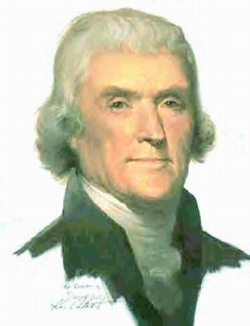Liberty Matters
Final Response

Regarding Jefferson's "justifications or rationalizations for his continuing to own, buy, and sell slaves," I am unaware how his critics could cite even his notorious Notes on the State of Virginia as evidence that he justified the enslavement of black people because of the physiognomy he observed between the races. His most troubling comments do not directly or indirectly justify enslavement; instead, they justify in Jefferson's mind the colonization of blacks away from Virginia in order to avoid a race war (see my original reply to Eicholz). Put differently, while Jefferson consistently wrote that black people possessed natural rights[1] and that justice demanded their emancipation,[2] he did not conclude that this entitled them to become equal citizens of Virginia upon emancipation-an emancipation that Jefferson included in his proposed "alterations" of Virginia's laws.[3] Of black colonization, Jefferson explained that they should be supplied "with arms, implements of household and of the handicraft arts, seeds, [and] pairs of the useful domestic animals." He added that Virginia should, in that event, "declare them a free and independent people," and that Virginians should "extend to them our alliance and protection, till they have acquired strength."
In short, Jefferson did not use his comments about the inferiority of superficial characteristics of black people to justify his own enslavement of them. As Jefferson put it, "whatever be their degree of talent it is no measure of their rights. Because Sir Isaac Newton was superior to others in understanding, he was not therefore lord of the person or property of others."[4] This is not to excuse his legal ownership and commodification of black people. It is only to argue that I have not come across any statement where he justifyied his enslavement of blacks according to any principle of right, justice, or nature.
On this reading, I do not think that the different audiences that Eicholz cites for the Declaration of Independence and Notes on the State of Virginia best refute the critics' charges of inconsistency in Jefferson's mind. As Eicholz states, "The historian who tries to understand the past in its own terms is serving very much as a translator between eras" (emphasis in original). That translation starts with a due humility by historians who seek to discern the reasons offered for particular actions. Those words, those arguments, are the best reflection of the thought or reasoning for political actions. Ceteris paribus, these should constitute at minimum the beginning of one's understanding of the past. Thus, to bolster his point about different audiences dictating different arguments that Jefferson offers on the slavery question, Eicholz might say more about the character of Jefferson's arguments in his Notes that distinguish it from the arguments of the Declaration.
In 1776, Jefferson wrote that black people possessed "sacred rights."[5] I cannot think of a stronger way of saying that someone deserves to be free than to say that in the eyes of their Creator they possess the rights of "life and liberty." In 1781, Jefferson commented on the "unhappy influence on the manners of our people produced by the existence of slavery among us," describing the practice as "tyranny."[6] He was just warming up. "Indeed," he concluded, "I tremble for my country when I reflect that God is just: that his justice cannot sleep forever." He went on to contemplate that "an exchange of situation" might occur by "supernatural interference," where the "Almighty" would side with the enslaved rather than the enslavers.
Nevertheless, Jefferson continued to enslave black people, and justified to himself the legal (but not natural) right to do so on the basis of the natural right of self-preservation-namely, his and fellow white slaveholders' fear of reprisal, in addition to the servile condition of Virginia slaves ill-equipping them for life in civil society.[7] Thomas W. Merrill has described this as "an irreconcilable conflict of rights," which at least in Jefferson's case, led him to justify his continued legal ownership of black people on the basis of a concern for white people's self-preservation.[8]
Historians duly attentive to the arguments of influential figures of the past, even self-serving arguments like Jefferson's, do well to consider them as essential components of understanding both the explanations and motives of important political actors. Eicholz rightly indicates how an older approach to understanding old things may very well remain a more accurate way of doing history.
Endnotes
[1] Draft of the Declaration and Thomas Jefferson to Henri Gregoire (February 25, 1809).
[2] Thomas Jefferson to John Holmes (April 22, 1820).
[3] Thomas Jefferson, Query XIV: On Laws, Notes on the State of Virginia.
[4] Thomas Jefferson to Henri Gregoire (February 25, 1809).
[5] Draft of the Declaration.
[6] Thomas Jefferson, Query XVIII: On Manners, Notes on the State of Virginia.
[7] Thomas Jefferson to Edward Coles (August 25, 1814).
[8] Thomas W. Merrill, "The Later Jefferson and the Problem of Natural Rights" in The Political Thought of the Civil War, ed. Alan Levine, Thomas W. Merrill, and James R. Stoner, Jr. (Lawrence, KS: University Press of Kansas, 2018), 44.
Copyright and Fair Use Statement
“Liberty Matters” is the copyright of Liberty Fund, Inc. This material is put on line to further the educational goals of Liberty Fund, Inc. These essays and responses may be quoted and otherwise used under “fair use” provisions for educational and academic purposes. To reprint these essays in course booklets requires the prior permission of Liberty Fund, Inc. Please contact oll@libertyfund.org if you have any questions.